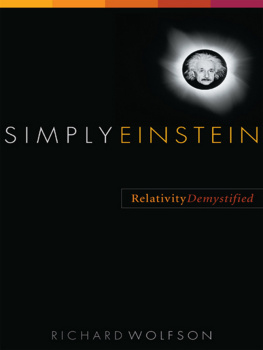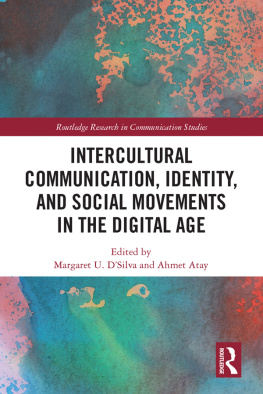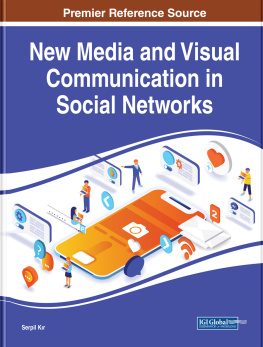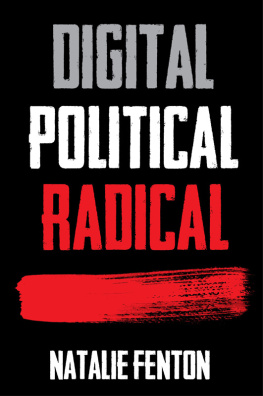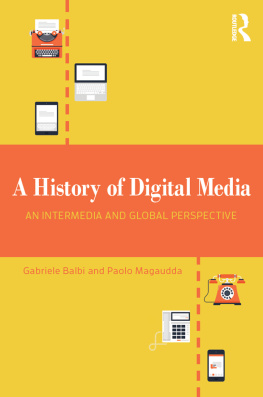Wolfson - Digital rebellion: the birth of the cyber left
Here you can read online Wolfson - Digital rebellion: the birth of the cyber left full text of the book (entire story) in english for free. Download pdf and epub, get meaning, cover and reviews about this ebook. City: Urbana, year: 2017;2014, publisher: University of Illinois Press, genre: Politics. Description of the work, (preface) as well as reviews are available. Best literature library LitArk.com created for fans of good reading and offers a wide selection of genres:
Romance novel
Science fiction
Adventure
Detective
Science
History
Home and family
Prose
Art
Politics
Computer
Non-fiction
Religion
Business
Children
Humor
Choose a favorite category and find really read worthwhile books. Enjoy immersion in the world of imagination, feel the emotions of the characters or learn something new for yourself, make an fascinating discovery.

Digital rebellion: the birth of the cyber left: summary, description and annotation
We offer to read an annotation, description, summary or preface (depends on what the author of the book "Digital rebellion: the birth of the cyber left" wrote himself). If you haven't found the necessary information about the book — write in the comments, we will try to find it.
Wolfson: author's other books
Who wrote Digital rebellion: the birth of the cyber left? Find out the surname, the name of the author of the book and a list of all author's works by series.
Digital rebellion: the birth of the cyber left — read online for free the complete book (whole text) full work
Below is the text of the book, divided by pages. System saving the place of the last page read, allows you to conveniently read the book "Digital rebellion: the birth of the cyber left" online for free, without having to search again every time where you left off. Put a bookmark, and you can go to the page where you finished reading at any time.
Font size:
Interval:
Bookmark:
Digital Rebellion
THE HISTORY OF COMMUNICATION
Robert W. McChesney
and John C. Nerone, editors
A list of books in the series
appears at the end of this book.
The Birth of the Cyber Left
TODD WOLFSON

2014 by the Board of Trustees
of the University of Illinois
All rights reserved
Manufactured in the United States of America
1 2 3 4 5 C P 5 4 3 2 1 This book is printed on acid-free paper.
This book is printed on acid-free paper.
Library of Congress Cataloging-in-Publication Data
Wolfson, Todd, 1972
Digital rebellion : the birth of the cyber left / Todd Wolfson.
pages cm. (History of communication)
ISBN 978-0-252-03884-6 (hardback)
ISBN 978-0-252-08038-8 (paper)
ISBN 978-0-252-09680-8 (ebook)
1. Social movementsTechnological innovations. 2. Political
participationTechnological innovations. 3. InternetPolitical
aspects. 4. Mass mediaPolitical aspects. 5. Radicalism. I. Title.
HM881.W65 2014
302.23'1dc23 2014020605
For my parents,
Linda and Les Wolfson
The struggle for justice is hard, but it is made easier by thousands of everyday people, fighting to build a society based on the belief in dignity for all. This book is a small contribution to this long struggle. And while it bears my name and the burden of my shortcomings, I could not have put it together without the generous help and insight of many comrades, colleagues, and friends. I was blessed to think, grow, and learn with many minds.
Digital Rebellion emerged out of my dissertation, and it would not have been possible without the support of faculty and colleagues at the University of Pennsylvania. Chief among them is Peggy Reeves Sanday, my advisor, who endured my intellectual whimsies and political commitments with patience. Her integrity and belief in an engaged academic project as well as her dedication to intellectual rigor set a compass for my career. Along with Peggy, I would like to acknowledge the rest of my dissertation committee for their generous support, including Kathy Hall, Michael Delli Carpini, and John Jacksoneach of whom played vital roles in this undertaking.
Along with my advisors, an army of colleagues at Penn pushed my thinking, sharpened my understanding, and forced me to reckon with my rather large blind spots. In this regard, I must offer a special thanks to Peter Funke. Every idea I had and every page I wrote came out of a long, ongoing conversation. In many ways he is a coauthor on this work, and hope I can be half as useful to him as he has been to me. Accompanying Peter are the many colleagues at Penn that consistently compelled my thinking: Michael Janson, Robert Fairbanks, Raymond Gunn, Sergio Saenz, Saskia Fischer, Gregory Wolmart, Amy Bach, Lauren Silver, John Fitzgerald, Caitlin Anderson, Mark Bostic, Jeff Hornstein, and many others. I have also had the good fortune to receive the advice of many scholars along the way, including Ed Herman, Michael Hardt, Adolph Reed, Sam Gindin, Leo Panitch, Dorothy Kidd, John Downing, Christina Dunbar-Hester, Jack Bratich, George Collier, Stanley Aronowitz, Douglas Kellner, Harry Cleaver, and especially Nick Dyer-Witheford. I also want to thank the University of Illinois Press and particularly the support of Danny Nassett.
This work is seriously indebted to the Media Mobilizing Project and the many political projects and people that I have been blessed to be involved with over the last decade. This includes Shivaani Selvaraj, Mica Root, Phil Wider, Nijmie Dzurinko, Desi Burnette, Ron Blount, Alix Webb, Bryan Mercer, Rebekah Phillips, Kristin Campbell, Hannah Sassaman, Erika Almiron, Rachel Goffe, Megan Williamson, Fred Pinguel, Amalia Deloney, Martin Lautz, John Hough, Steve Chrevenka, Al Alston, Carmen Cuadrado, Amendu Evans, Audra Trayham, Peter Bloom, Lawrence Jones, Koby Murphy, Quon Blanche, Charles Clark, Willie Baptist, Liz Theoharris, Liz McElroy, Mohammad Shukur, Bill Zoda, Tekle Gebrehmdin, Patrick Anamah, Gary Broderick, Dina Yarmus, Ron Whitehoren, Patty Eakin, and many other people I have had the good fortune to build with in Philadelphia, across Pennsylvania, and beyond. I would also like to thank many people from the indymedia movement that took time out to grant me interviews or shared their thinking on indymedia and social-movement building, including Jay Sand, Jeff Perlstein, Amy Dalton, Joshua Breitbart, Susanna Thomas, Aaron Couch, DeeDee Halleck, Chris Burnett, Sascha Meinrath, Dan Merkle, Sheri Herndon, John Tarleton, Greg Ruggiero, Inja Coates, Alec Meltzer, Rich Gardener, Mike Rosenberg, Petri Dish, Josh Marcus, Michael Eisenmenger, C. W. Anderson, and Matthew Arnison. The work of indymedia has truly been an inspiration.
I would also like to thank my family, who made me stronger and more in touch with life through a mixture of torture, love, and play. In particular my parents, Linda and Les, my sister and brother, Shelly and Jonathan, and their partners Cary and Nelly, and my favorite nieces and nephews, Emery, Reece, Pierce, Nev, and Indy.
I owe a particularly large debt of gratitude to my son Sebastian, who in two short years has given me more joy than I could have ever imagined. I am sure the joy will increase, exponentially with the arrival of his brother or sister, who is about to join us, ready or not. Finally, this book would not have been possible without my partner in life, Alison Taylor. She has been my lifeline as I trudged through this process, from copy editing to helping me refine my analysis. Alison has taught me a great deal in the last decade, and both this book and I are immeasurably better for it.
In attempting to articulate their visionary ideals, and thereby negate the accepted view of reality, different American Lefts have displayed different intellectual temperaments. The Lyrical Left tended at first to rely upon the regenerating force of culture and the imaginative power of poetry as a means of manifesting premature truths; the Old Left saw in the science of Marxism a method of historical understanding that would enable man to triumph over the contradictions of capitalism; and the New Left embraced an existential ethic of moral choice and human commitment as a way of overcoming the paradoxes of alienation.
John Patrick Diggins, The Rise and Fall of the American Left
In an instant, the immaterial aspects of the financial capitalist system melted away, as the tightly held logic of neoliberalism came crashing inward. The world watched with fear and awe as the collapse of the speculative markets quickly exposed the entire financial system, and foundational institutionsimbued with all of the power and majesty of global capitalcrumbled before our eyes. The price of the hubris, however, went beyond the boardrooms of Lehman Brothers, and in a few short months the grim realities of the crisis took a vicious toll on working people. Families lost their houses to foreclosure, elderly couples lost their life savings to the rapacious market, and working people lost their jobs and livelihood to the aggressive greed of an unchecked financial system.
In the shadow of the growing economic disaster, which unjustly meted out punishment on the most precarious, political leaders stepped in with massive bailouts, engineered by the very people who created the crisis, in an effort to save banks deemed too big to fail. And in time, as our collective memory waned, these same political leaders fixed their gaze on the meager support system of the poor and working class, demanding austerity budgets and calling for shared sacrifice. The sacrifice, however, was not shared, as the market rebounded for the few, while the growing legion of poor and working people were left to shoulder the burden of the twenty-first centurys first global economic and human crisis.
Next pageFont size:
Interval:
Bookmark:
Similar books «Digital rebellion: the birth of the cyber left»
Look at similar books to Digital rebellion: the birth of the cyber left. We have selected literature similar in name and meaning in the hope of providing readers with more options to find new, interesting, not yet read works.
Discussion, reviews of the book Digital rebellion: the birth of the cyber left and just readers' own opinions. Leave your comments, write what you think about the work, its meaning or the main characters. Specify what exactly you liked and what you didn't like, and why you think so.

